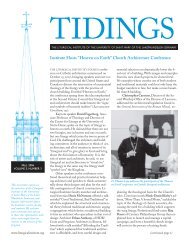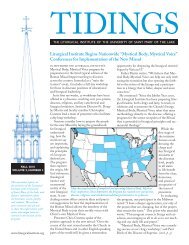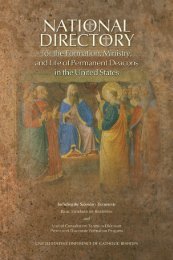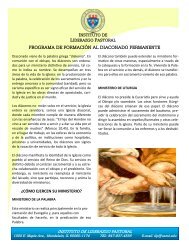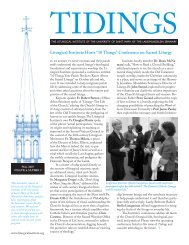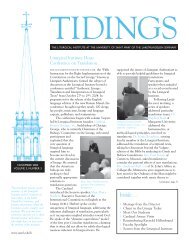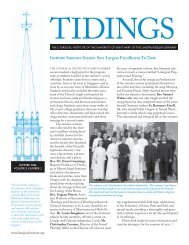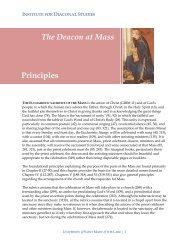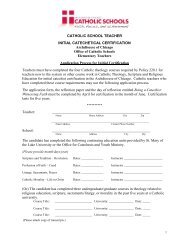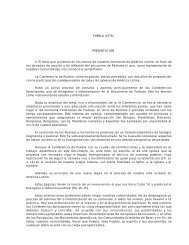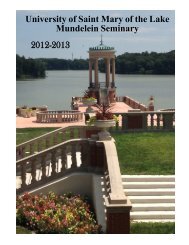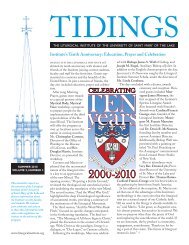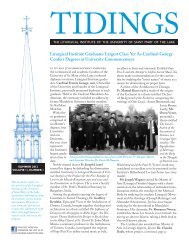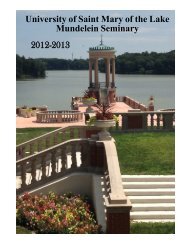Department of Systematic Theology - Mundelein Seminary
Department of Systematic Theology - Mundelein Seminary
Department of Systematic Theology - Mundelein Seminary
You also want an ePaper? Increase the reach of your titles
YUMPU automatically turns print PDFs into web optimized ePapers that Google loves.
DEPARTMENT OF SYSTEMATIC THEOLOGY<strong>Department</strong> Chairperson:Rev. Emery de GaálPr<strong>of</strong>essor Emeritus:Rev. Charles R. MeyerPr<strong>of</strong>essors:Rev. Thomas A. BaimaRev. Robert E. BarronSr. Sara Butler, M.S.B.T.Rev. Lawrence R. HennesseyRev. Edward Oakes, S.J.Associate Pr<strong>of</strong>essors:Rev. Emery de GaálAssistant Pr<strong>of</strong>essor:Rev. Scott HebdenInstructor:Rev. Ronald KunkelAffiliate Faculty:Rev. Michael Fuller (Christian Life)Rev. Douglas Martis (<strong>Systematic</strong> <strong>Theology</strong> and Worship)Dr. Christopher McAtee (Pastoral <strong>Theology</strong>)Rev. James Presta (Pre <strong>Theology</strong> and Christian Life)Rev. Raymond Webb (Pastoral <strong>Theology</strong>)Adjunct Faculty:Dr. Lynne BoughtonMr. Christopher Carstens(Chr) = counts for Christology elective(LTG) = counts for Liturgical electiveSY211SY213FUNDAMENTAL THEOLOGYThe course examines the foundations <strong>of</strong> faith and theology. It considers thereligious nature <strong>of</strong> humankind, theories <strong>of</strong> revelation and faith, the development<strong>of</strong> the Christian tradition and its role in Christian life, the inspiration <strong>of</strong> Scripture,and the relationship <strong>of</strong> Christianity to other religions.de Gaál FCHRISTOLOGYThis course will begin and end with considerations <strong>of</strong> method in Christology andevangelization. Course material will be considered in three units: the quest for thehistorical Jesus and New Testament Christologies and Soteriologies; the earlyChristological controversies and decisions <strong>of</strong> Church councils; and aconsideration <strong>of</strong> special questions and a survey <strong>of</strong> contemporary developmentsin Christology and Soteriology.Hebden W-S72
SY214DOCTRINE OF GODThe purpose <strong>of</strong> this course is to study the Christian understanding <strong>of</strong> God as ithas been articulated by some <strong>of</strong> the great theological figures <strong>of</strong> our tradition. Thefirst part <strong>of</strong> the course will be an examination <strong>of</strong> the Patristic debates concerningthe nature <strong>of</strong> God and a careful reading <strong>of</strong> the classical Trinitarian theologies <strong>of</strong>St. Augustine and St. Thomas Aquinas. The second section <strong>of</strong> the course will bean analysis <strong>of</strong> classical teaching in response to contemporary concerns.BarronWSY215CHRISTIAN ANTHROPOLOGYThis class treats theological notions about the origin <strong>of</strong> the universe and <strong>of</strong>humanity. Encompassing the major themes <strong>of</strong> creation, grace, sin, andeschatology, this course will examine such topics as "imago dei," original sin andfree will, divine grace, heaven, hell, purgatory, the end <strong>of</strong> the world, and theSecond Coming <strong>of</strong> Christ.Kunkel SSY216ECCLESIOLOGYAs Christians we pr<strong>of</strong>ess belief that the Church is one, holy, catholic andapostolic. This course will examine the doctrine which has expounded that beliefthrough history and which finds its most developed articulation in the teaching <strong>of</strong>the Second Vatican Council. In particular, we will examine the variouscomponents <strong>of</strong> the doctrine <strong>of</strong> the Church, its structure, constitution, teachingauthority, diversity and unity; by which it actualizes itself as the universalsacrament <strong>of</strong> salvation.PrestaFSY217SACRAMENTS OF INITIATIONThe sacraments <strong>of</strong> initiation (Baptism, Confirmation, and Eucharist) initiate menand women into the Body <strong>of</strong> Christ. This course examines intensively the currentrites <strong>of</strong> initiation in their historical, theological, canonical, and practicaldimensions. Particular attention is given to the Rite <strong>of</strong> Christian Initiation <strong>of</strong>Adults. The course is introduced with a review <strong>of</strong> fundamental principles <strong>of</strong>sacramental theology.MartisWSY218SACRAMENTS OF HEALING AND VOCATIONThis course treats the two sacraments <strong>of</strong> healing (Reconciliation and Anointing),and the two sacraments at service <strong>of</strong> communion (Marriage and Ordination). Therevised rites <strong>of</strong> the Church provide the basis for study for the course. These areexamined in their theological, historical, canonical, and practical dimensions.The course concludes with an examination <strong>of</strong> the Order <strong>of</strong> Christian Funerals.Kunkel F73
SY219INTEGRATING SEMINARThis course is designed to help students understand the pastoral implications <strong>of</strong>theology and the theological implications <strong>of</strong> pastoral situations. Using conceptsand practices developed in previous classes on theological reflection, the goal <strong>of</strong>this course is to help the seminarian integrate his theological and pastoral educationby specifically learning how the pastor is the community’s theologian. (4 thYear) (2 Credits)McAtee WSY220INTEGRATING SEMINAR IIWebbWSY221THEOLOGY OF HOLY ORDERSIn this seminar the students will read Death Comes to the Archbishop, The Powerand the Glory, and The Diary <strong>of</strong> a Country Priest. We will be discussing howthese works <strong>of</strong> literature portray the priesthood and reveal certain cultural, theologicaland spiritual understandings and how they illuminate the teachings <strong>of</strong> theChurch, as especially seen in Pastores Dabo Vobis. Our goal is to understandthe mission <strong>of</strong> the priest.FullerFSY222SY308SY309ECUMENICAL AND INTERRELIGIOUS DIALOGUE (Pilgrimage)One <strong>of</strong> the streams <strong>of</strong> thought at the Second Vatican Council was the engagements<strong>of</strong> the Catholic Church with those outside its boundaries. In the course <strong>of</strong>the general congregations, this stream <strong>of</strong> thought took shape as a decree andtwo declarations. More significantly, after the council each element was given apermanent structure in the Roman Curia to foster its implementation. This coursewill examine the principles which direct the Catholic Church’s engagement withother Christians and other believers. (3rd Year Required)BaimaWTHEOLOGICAL ISSUES IN HISPANIC MINISTRYThis course will focus on the development <strong>of</strong> theological reflection flowing fromengagement in the pastoral realities and problems <strong>of</strong> the Hispanic community inthe United States. The work <strong>of</strong> Hispanic theologians will be explored. Topicswhich may be considered include faith and inculturation, popular religion as focus<strong>of</strong> theological reflection, the ecclesiology <strong>of</strong> base Christian communities, thecharismatic renewal. (PL328)Hebden WSOTERIOLOGY (CHR)This course considers the dynamics <strong>of</strong> salvation in the Roman Catholic tradition.It attempts to answer the questions: How does the death and resurrection <strong>of</strong>Christ initiate a dynamic <strong>of</strong> transformation and renewal in human history? Howdo Christians participate in and how does the mission <strong>of</strong> the Church cultivate andapply this dynamic <strong>of</strong> transformation? Emphasis will be placed on the contemporaryappropriation <strong>of</strong> the classical tradition including theological, psychologicaland social dimensions. (Canonical)Hebden S74
SY314SY320SY344THEOLOGY AND SOCIAL JUSTICEThe course will explore the interaction between contemporary systematic theologyand the social justice teachings <strong>of</strong> the Church. Questions <strong>of</strong> theologicalmethod will be discussed along with the way that social justice concerns acts as akey influence n the development <strong>of</strong> particular Catholic theologians.Hebden SCHRISTOLOGY AND LITURGY OF RATZINGER/BENEDICT XVI (CHR)In the person <strong>of</strong> Joseph Ratzinger a man has become Pope at the beginning <strong>of</strong>the 21 st Century who had already shaped the Catholic Church in the second half<strong>of</strong> the 20 th century more than any other single person, save John Paul II. As universitypr<strong>of</strong>essor he directed over fifty doctoral candidates, as scholar he authoredover 250 titles, as peritus he contributed in central ways to the II. VaticanCouncil, as archbishop he pastored a major see, and as prefect <strong>of</strong> the CDF hegave Catholic faith in her dialogue with the world a distinctive theological pr<strong>of</strong>ile.This course will examine the origins and the gravitational centers in Pope BenedictXVI Christology. It will explore his staurocentric view and its attendant ramificationson his understanding <strong>of</strong> the nature <strong>of</strong> the Church. (Canonical)de Gaál SPNEUMATOLOGYA long neglected dogmatic discipline, it deals with the nature and works <strong>of</strong> theHoly Spirit as the Third Divine Person. Only via “a universal Pneumatology doesone arrive at Christology” (Karl Rahner). Only “in the Spirit” is it possible to state“Jesus is the Lord” (1 Cor 12,3). This evidences Pneumatology as a key disciplinegranting access to the whole <strong>of</strong> theology. Mindful <strong>of</strong> Eastern Christian impulsesin this critical area, this course is ecumenical in scope and intention.de Gaál WSY346SY368SY385MARIOLOGY: CONTEMPORARY PERSPECTIVES (CHR)Many fundamental theological questions meet in the study <strong>of</strong> Mariology: Christology,Christian Anthropology, the Church, the questions <strong>of</strong> the Reformation. Thiscourse will review the Church’s teachings regarding Mary and will investigatehow they are received in ecumenical and feminist theology. (Canonical)de Gaál TBACONTEMPORARY THEMES IN TRINITARIAN THEOLOGYThis course will review the teaching <strong>of</strong> the Scripture and the Magisterium but itwill give special attention to the contemporary retrieval <strong>of</strong> St. Thomas Aquinas’stheology <strong>of</strong> the Trinity. In addition, students will explore several themes that occupycurrent theological reflection: the correlation <strong>of</strong> Trinitarian theology withChristology and Christian Anthropology; the Trinitarian names; the relation <strong>of</strong>“economic” to “immanent” Trinity; and the Trinity and the Church in ecumenicaldialogue.ButlerFSELECTED QUESTIONS IN THE DEVELOPMENT OF DOGMAThis course will consider how the apostolic faith is transmitted from one generationto the next, with attention to the place <strong>of</strong> Sacred Scripture, Tradition, the sensusfidelium, theology, and the Magisterium. The class will investigate the principlesinvolved by reading Cardinal Newman’s Essay on the Development <strong>of</strong> Doctrineand by observing how they function in relation to three case studies: theImmaculate Conception, papal primacy, and the reservation <strong>of</strong> priestly ordinationto men. Butler S75
SY408SY412SY422SY429SY436EUCHARISTIC CONTROVERSIES OF THE 16TH CENTURY: THEPROTESTANT REFORMATION AND THE COUNCIL OF TRENTThis course will begin with a study <strong>of</strong> the teachings <strong>of</strong> the leaders <strong>of</strong> the Reformationon the Eucharist and its liturgical celebration. The writings <strong>of</strong> Luther, Calvin,Zwingli, Bucer and Melanchthon on the Lord's Supper will be carefully consideredand evaluated. We will then proceed to consider the response <strong>of</strong> the Council <strong>of</strong>Trent and the Catholic reformation with regard to the sacrament <strong>of</strong> the Eucharistand the celebration <strong>of</strong> the Mass. The themes <strong>of</strong> Real Presence, Eucharistic sacrifice,priesthood and sacramental communion will be given particular attention.(Canonical)Kunkel STOPICS IN CHRISTOLOGY (CHR)This course will focus on four topics especially: the role <strong>of</strong> historical criticism <strong>of</strong>the New Testament for resolving the tension between the Jesus <strong>of</strong> history andthe Christ <strong>of</strong> faith; the legacy <strong>of</strong> the Council <strong>of</strong> Chalcedon for later Christology;the role <strong>of</strong> Christ’s beatific vision in the Christology <strong>of</strong> St. Thomas Aquinas; andthe debate over Christology and pluralism, that is, the relation <strong>of</strong> the founders <strong>of</strong>other world religions to Christ. Other topics, though, will be allowed as researchtopics for the students’ final term paper, depending on their interest. (Canonical)OakesWPRIESTHOOD AND MINISTRY: YESTERDAY AND TODAYThis course will examine the following issues: the diocesan priesthood beforethe council <strong>of</strong> Trent; secular involvement; distinctive lifestyle; typical ministries;the priestly charism; institutionalization; theories <strong>of</strong> essential role; women aspriests; role pr<strong>of</strong>essional knowledge and apostolate, and the priest as mystagogue.(HI422)MeyerWNCTI FALL SEMINAR: GLOBAL THEOLOGIESGlobalization has produced an increased encounter between different culturesand religions. These encounters have brought new questions to theology whichhave never before been asked. The questions challenge Christian theologians tothink anew about the basic doctrines <strong>of</strong> the Faith. The Fall NCTI seminar will exploresome <strong>of</strong> the dimensions <strong>of</strong> theology that have been opened by globalization,such as “Christology: Christ as Healer and Ancestor in Africa,”“Anthropology: Human Identity in Shame-Based Cultures <strong>of</strong> the Far East,” and“Pneumatology: The Holy Spirit in Latin American Pentecostalism.” Discussion <strong>of</strong>these topics will be led by the diverse faculty <strong>of</strong> NCTI and ACTS and will seek toinclude a variety <strong>of</strong> perspectives: Roman Catholic and Protestant, Ecumenicaland Evangelical. Special attention will be paid to how these questions presentchallenges to evangelism, apologetics and ecumenism.Baima & NCTI Staff FTHE EXPERIENCE OF THE TRIUNE GOD: THE THEOLOGY OFFR. DUMITRU STĂNILOAE (CHR)This course surveys the theology and spirituality <strong>of</strong> Fr. Dumitru Stăniloae (1903-1993). Arguing against any reduction <strong>of</strong> the human spirit, such as Nationalismand Communism, and surviving Communist imprisonment, Stăniloae develops anoriginal, systematic presentation <strong>of</strong> Orthodox dogmatics and integrates a richspirituality into his vast œuvre: the God-man Jesus Christ enables our participationin triune life already in the here and now. Along with Karl Rahner and KarlBarth, this Romanian thinker is considered one <strong>of</strong> the towering figures <strong>of</strong> 20thcentury theology. This course may be found appealing by those interested in76
spirituality, patristics and Orthodox systematic theology and the integration andreciprocal interpenetration <strong>of</strong> the same. (Canonical, Christology, Spirituality)de Gaál FSY445SY448THE EUCHARIST AND THE CHURCHThis course will examine the important relationship between Eucharistic theologyand ecclesiology, focusing on the notion <strong>of</strong> the Body <strong>of</strong> Christ. We will considerthe Pauline teaching on the sacrament <strong>of</strong> Christ’s Body and the Church asChrist’s mystical body. The encyclical letters <strong>of</strong> Pope Pius XII, Mystici Corporisand Mediator Dei, will be carefully studied. The theological insights <strong>of</strong> Henri deLubac, John Zizioulas, Paul McPartlan and Pope John Paul II with regard to thistheme. (Canonical) Kunkel FTHE EUCHARIST AS SACRAMENT AND SACRIFICE IN ROMAN CATHOLICTRADITIONAn investigation into Eucharist doctrine: in Scripture; the great controversies; realpresence; transubstantiation; sacramental matter and form, minister, recipientand effects; the idea <strong>of</strong> sacrifice; the Eucharist and the Cross; the double consecration;epiclesis; the essence and effects <strong>of</strong> the sacrifice. (Canonical)MeyerFSY452SY471SY472SY509THOMAS AQUINAS AND THE DOCTRINE OF GODThe idea <strong>of</strong> God entertained by many people to whom the priest must minister isone derived ultimately from the teachings <strong>of</strong> St. Thomas Aquinas. After readingsections for the Prima Pars <strong>of</strong> the Summa as well as other works <strong>of</strong> the AngelicDoctor, we will discuss his doctrine with a new view to acculturating it in the worldin which we live. (Canonical)MeyerSMARTIN LUTHER, REFORMERA study <strong>of</strong> the psychology, theology, and ministerial style <strong>of</strong> the great Reformer toseek what relevance it has for the Church today in both its attempts at reform andits ecumenical quest. (HI471)MeyerWGOD AND THE PROBLEM OF EVILThe greatest pastoral problem that the minister must deal with is the explanation<strong>of</strong> how a good and loving God can permit the horrors created by people, as wellas by nature, which parishioners hear about and sometimes experience. Indeed,Christian theology as a whole integrates itself most fully as a way <strong>of</strong> coping withthe problem <strong>of</strong> evil.MeyerSTEACHING ASSISTANCE(Required 2nd Year STL) Lodge F-W-SSY510HISTORY OF CHRISTIAN THOUGHT IThis course will examine Christology, Doctrine <strong>of</strong> God, and TheologicalAnthropology in the New Testament to see how these are in the earliest traditions<strong>of</strong> the Church. With that as a background, students will then examine thewritings <strong>of</strong> the Apostolic Fathers and the Apologists to see how these developedin the second century <strong>of</strong> Christianity. (Required 1st Year STL)Hennessey F77
SY511CLASSICS OF 20TH CENTURY THEOLOGYThis course will explore the works <strong>of</strong> five <strong>of</strong> the most important and influentialChristian theologians <strong>of</strong> the twentieth century: Barth, Tillich, von Balthasar,Rahner, and Lonergan. We will read major texts <strong>of</strong> each <strong>of</strong> these figures,concentrating on questions <strong>of</strong> theological method, the relationship betweenreligion and culture, the knowability <strong>of</strong> God, the rapport between philosophy andfaith, theological anthropology and the centrality <strong>of</strong> Christ. (Required 1st YearSTL)OakesFSY512HISTORY OF CHRISTIAN THOUGHT IIThis course is a close examination <strong>of</strong> the development <strong>of</strong> the Catholic Tradition inboth the East and West from 200 to 800 AD. Emphasis is placed on a criticalreading <strong>of</strong> texts from significant authors that highlight the major themes <strong>of</strong>Christology, Trinitarian theology, and theological anthropology. The texts are setin context <strong>of</strong> the general history <strong>of</strong> the Christian Church during these centuries,including, Christianity's encounter with the rise <strong>of</strong> Islam. (6 hrs; Required 1st YearSTL)Hennessey WSY513AHISTORY OF CHRISTIAN THOUGHT III - ADuring this quarter, we will examine the development <strong>of</strong> the Doctrine <strong>of</strong> God inthe Catholic Tradition, primarily in the Latin West, from Boethius to St. ThomasAquinas. From a vast literature, we will emphasize a critical reading <strong>of</strong> selectedtexts from Boethius, Dionysius, John Scotus Eriguena, Anselm, Bernard <strong>of</strong> Clairvaux,Bonaventure, and Thomas Aquinas that highlight the major themes <strong>of</strong> Trinitarian<strong>Theology</strong>. The texts will be set in the context <strong>of</strong> the general history <strong>of</strong> philosophyand theology during these centuries.Hennessey SSY514SY515HISTORY OF CHRISTIAN THOUGHT IVThis course will examine questions in Christian Anthropology, Christology, andthe Doctrine <strong>of</strong> God raised during the 16th and 17th centuries as they appear inthe works <strong>of</strong> the Reformers (Luther and Calvin in particular), in the Catholicresponse at the Council <strong>of</strong> Trent, and in the confessional statements <strong>of</strong> theReformation. It will also consider the post-Tridentine Catholic controversiesregarding grace. (Required 2nd Year STL)BarronFHISTORY OF CHRISTIAN THOUGHT VThis course explores some <strong>of</strong> the major themes in the Christian theologicalthought <strong>of</strong> the 18th and 19th centuries. Our study begins with an analysis <strong>of</strong> thecultural/philosophical trends that emerged in the Enlightenment. Then we turn toa reading <strong>of</strong> selected works from Immanuel Kant, Friedrich Schleiermacher,Johann Adam Möhler, G.W.F. Hegel, Søren Kierkegaard, Antonio Rosimini andMatthias Scheeben. Some themes to be considered are the play betweenreason and revelation, experience as a starting point for theological reflection, theProtestant and Catholic responses to the Enlightenment, including Vatican I, andthe rapport between religion and culture. (Required 2nd Year STL)de Gaál W78
SY516SY523CONTEMPORARY THOUGHTThis course will examine selected authors whose contributions exemplify leadingcurrents and concerns in post-conciliar Catholicism: liberation theology and feministtheology, Trinitarian theology, and the Thomist revival. The concerns addressedby these authors will be placed in the larger context <strong>of</strong> the movementsthey represent and assessed with reference to the fundamental criteria for Catholictheological method. (Required 2nd Year STL).ButlerWHISTORY OF CHRISTIAN THOUGHT III - BThis course will be an opportunity to explore themes in anthropology and Christologyas developed by theologians <strong>of</strong> the medieval period. An appreciation forthe integration <strong>of</strong> theology and spirituality during this period will be emphasized.Particular attention will be given to the development in understanding <strong>of</strong>the uniqueness <strong>of</strong> the human person and <strong>of</strong> the redemptive work <strong>of</strong> Christ(Soteriology). Both primary and secondary sources will be considered. (Required1st Year STL)Hebden FSY535SY539SACRAMENTAL THOUGHT AND PRACTICE IN THE TWENTIETHCENTURYA review <strong>of</strong> twentieth-century developments in sacramental theology and practiceis given. The influences <strong>of</strong> Mediator Dei and Sacrosanctum Concilium are examined.The liturgical theology <strong>of</strong> the Catechism <strong>of</strong> the Catholic Church is reviewed.Particular attention is given to the transition <strong>of</strong> the 1970 Missale Romanum, andissues regarding its subsequent revision and translation into the vernacular.MartisWTHEOLOGY AND SPIRITUALITY OF THE LITURGY(see LI551 for course description) Fuller FSY300SY399SY400SY499SY-P3SY-P5SY-P7INDEPENDENT STUDY (300-level)OUTSIDE COURSE (300-level)INDEPENDENT STUDY (400-level)OUTSIDE COURSE (400-level)WRITING OF PAPER(2nd Year STL) Lodge F-W-SDEFENSE OF PAPER(Required 2nd Year STL) Lodge F-W-STHESIS GUIDANCEThe students in the second year <strong>of</strong> the Licentiate Program meet weekly with theteaching staff to discuss the progress <strong>of</strong> their licentiate papers. 2 Credits(Required 2nd Year STL)LodgeF-W-S79
<strong>Department</strong> Chairperson:Rev. Michael FullerAssociate Pr<strong>of</strong>essor:Rev. Patrick Boyle, S.J.Rev. Michael FullerAssistant Pr<strong>of</strong>essor:Dr. Melanie BarrettDEPARTMENT OF CHRISTIAN LIFEAffiliate Faculty:Rev. Martin Barnum (Pastoral Life)Rev. Lawrence Hennessey (<strong>Systematic</strong> <strong>Theology</strong>)Adjunct Faculty:Rev. Michael Bradley (Canon Law)Most Rev. Joseph Perry (Canon Law)Rev. James Presta (Pre-<strong>Theology</strong> and <strong>Systematic</strong> <strong>Theology</strong>)Rev. Daniel Smilanic (Canon Law)(Sp) = Spiritual <strong>Theology</strong>(M-1) = Fundamental Principles(M-2) = Sexuality(M-3) = Marriage(M-4) = Medical Ethics(M-5) = JusticeCL211CL212CL213CHRISTIAN PRINCIPLESThis course is an introduction to Catholic Moral <strong>Theology</strong>. Scripture, Tradition(Magisterium <strong>of</strong> the Church), and natural reason studied in light <strong>of</strong> moral decision-making. Christ is the paradigm <strong>of</strong> human action. The believer is challenged tolive the faith. Various methodologies are examined.BoyleWSPECIAL MORAL IThe purpose <strong>of</strong> this course is to deepen students’ understanding <strong>of</strong> the foundations<strong>of</strong> Catholic moral theology and then engage some practical issues. Partone explores the biblical foundations <strong>of</strong> moral theology and virtue as a path toholiness. Part two discusses the dignity <strong>of</strong> the human person and its practicalimplications for human life in society. Topics to be discussed include: war andpeace; poverty and wealth; private property and the free market; internationaldevelopment and the environment; ethical issues in farming and agriculture; andthe life issues <strong>of</strong> abortion and capital punishment.BarrettFCANON LAW IThis first course in Canon Law treats briefly the history <strong>of</strong> Canon Law up to andincluding the Revised Code. The first three Books <strong>of</strong> the Code are discussed:General Norms, the People <strong>of</strong> God, the Teaching Office <strong>of</strong> the Church.Smilanic /Bradley F80



